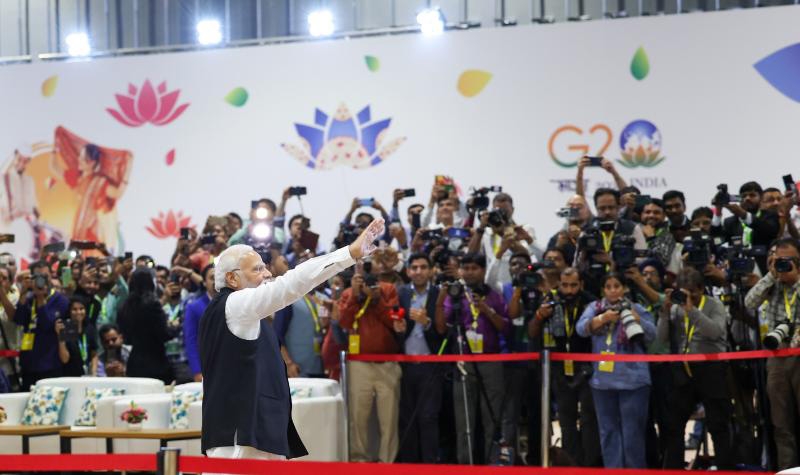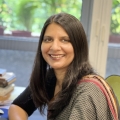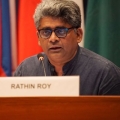Oxford Debate: Is India Becoming a Superpower?
VIEW EVENT DETAILSWith Yamini Aiyar, Frédéric Grare, Garima Mohan, and Rathin Roy

Prime Minister Narendra Modi visits the International Media Centre at the G20 summit, at Bharat Mandapam, in Pragati Maidan, New Delhi on September 10, 2023. Source: Prime Minister of India's Office.
Video
WATCH NOW
India is having an eventful year. The country has just hosted the world at the G20 summit in Delhi, shortly after welcoming more members into the BRICS group. (It also landed on the moon.) Under Prime Minister Narendra Modi, India has made a point of actively shaping the global order. Despite persisting domestic issues, from economic inequality to shrinking civil liberties, India is thriving in its foreign relations – which may help Modi's BJP as it gears up for elections in 2024. Under the current government, India is moving away from historic non-alignment to multi-alignment, liaising with and convening other countries in multi- and mini-laterals – all across a newly re-established divide between the West and the Global South. India's new appetite for foreign relations comes with an ambitious goal in mind: becoming the world's third largest economy in the coming years – and to emerge as a geopolitical superpower.
Will India be able to deliver on that growth and ambition? Can it leverage its digital transformation and demographic dividend successfully in other countries? Will China accept a superpower neighbor with whom it shares a disputed border and who continues to cooperate with its main competitor, the U.S.? Will India's rise to the top bring a truly multipolar world that is more stable and better equipped to cooperate on specific topics? Or will the country's complexity and internal divisions slow it down, as has been true in the past?
In this Oxford Debate we are debating whether India will become a global superpower in the next decade with Yamini Aiyar, Frédéric Grare, Garima Mohan, and Rathin Roy.
About Oxford Debates
The Oxford Debates at Asia Society Switzerland are a format to address ‘big’ questions that have no one answer or solution but are inviting many conflicting views. Four renowned experts in the field form teams of two, one team arguing for the motion, the other against it.
The Oxford-style format is broken down into four sections: opening remarks, rebuttals, a moderated question-and-answer session, and closing remarks. Before and after the debate the audience is polled whether they agree with the motion or not. The voting breakdown is not shared publicly until the end of the debate. The greater percentage change between the first and second votes determines the debate’s winning team.
Disclaimer: Positions presented in the debate do not necessarily represent the speakers’ views
Motion: India will become a global superpower in the next decade.
Arguing for the motion:

Frédéric Grare is a senior policy fellow with the Asia Programme at the European Council on Foreign Relations. He previously worked at the Center for Analysis, Planning and Strategy (CAPS) of the French Ministry for Europe and External Affairs (MEAE), Paris, where he focused on Indo-Pacific dynamics and Indian Ocean security issues. Prior to joining the French MEAE, he served as the South Asia programme director at the Carnegie Endowment for International Peace in Washington DC.
Grare holds a PhD from the Graduate Institute of International Studies in Geneva and a Habilitation from the Paris Institute of Political Science (Science Po) in Paris. His dissertation focused on Pakistan's policy in the Afghan conflict. He was a visiting scholar at the Carnegie Endowment for International Peace, a Counselor at the French embassy in Islamabad and Director of the Center for Social Sciences and Humanities in New Delhi. Grare has published extensively on topics related to South Asian security, India's Foreign Policy, Indo-Pacific dynamics and maritime security. His latest book The Indian Ocean as a New Political and Security Region was published in 2022. Grare also served as head of the Asia bureau at the directorate for strategic affairs of France's Ministry of Defence.

Garima Mohan is a senior fellow in the Indo-Pacific program, where she leads the work on India and heads the India Trilateral Forum. Based in GMF’s office in Berlin, her research focuses on Europe-India ties, EU foreign policy in Asia, and security in the Indo-Pacific. Prior to joining GMF, she was the acting team leader and coordinator for the EU's Asia-Pacific Research and Advice Network (APRAN), which supports EU policymakers on issues concerning the Asia-Pacific. She also led the Global Orders program at the Global Public Policy Institute in Berlin. Mohan holds a PhD from the Freie Universität Berlin and received her master's degree from the London School of Economics. She was a non-resident fellow at Carnegie India, an Asian Forum for Global Governance Fellow, and a 2017 Raisina Young Fellow. She has published widely on Indian foreign and security policy, EU-Asia relations, Germany-India ties, and maritime security in the Indo-Pacific, and is a frequent commentator for European and Indian media including NZZ, The Hindu, The Wire and Deutsche Welle.
Arguing against the motion:

Yamini Aiyar is the President and Chief Executive of the Centre for Policy Research (CPR), an independent public policy think tank based in New Delhi. Her work sits at the intersection of research and policy practice. Her research interests span the fields of public finance, social policy, state capacity, federalism, governance and the study of contemporary politics in India. In 2008, she founded the Accountability Initiative at CPR, which is credited with pioneering one of India's largest expenditure tracking surveys for elementary education. She has published widely in academic publications and the popular press, and writes regularly on current affairs and policy matters in mainstream Indian newspapers. Aiyar serves on a number of government and international policy committees as well as boards of nonprofits and think tanks. Her recent policy commitments include: Commissioner and Chair, Governance Working Group, Lancet Commission on Reimagining India's Health System; Member, Chief Minister's Rajasthan Economic Transformation Advisory Council; Member, United Nations Committee of the Experts on Public Administration; Council Member, United Nations University; and Member, Technical Advisory Group, National Data and Analytics Platform, NITI Aayog.
Aiyar is an alumna of the London School of Economics, St. Edmunds College, Cambridge University and St. Stephen's College, Delhi University.

Rathin Roy is Managing Director of ODI, an independent, global think tank based in London. His policy interests and research has mainly focused on fiscal and macroeconomic issues pertinent to human development in developing and emerging economies. Roy was formerly the Director and CEO of the National Institute of Public Finance and Policy (NIPFP) in New Delhi. He has previously worked as an Economic Diplomat and Policy Advisor at the United Nations Development Programme (UNDP), with postings in London, New York, Kathmandu and Brasilia. He has also served as an Economic Adviser with the Thirteenth Finance Commission, New Delhi, in the rank of Joint Secretary to the Government of India. Roy holds a Ph.D and an M.Phil in Economics from the University of Cambridge, an MA in Economics from the Jawaharlal Nehru University and BA (Hons) in Economics from St. Stephen's College, University of Delhi. He has taught at the Universities of Manchester and London.

